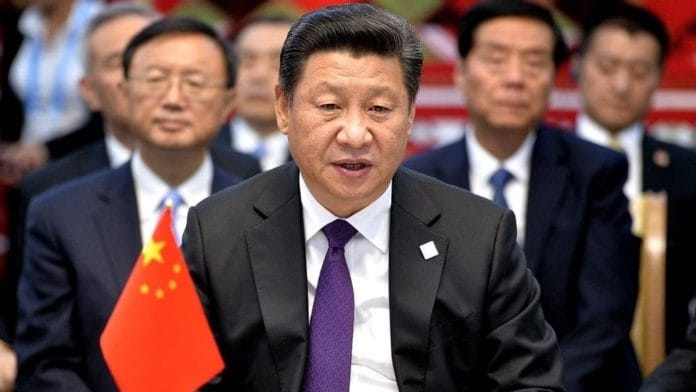New Delhi: Chinese President Xi Jinping has sacked two top leaders of its famed People’s Liberation Army Rocket Force (PLARF), which handles the nuclear arsenal of the country. Both the successors are from outside the force, which is unprecedented for the PLARF.
General Li Yuchao has been replaced as commander of the Rocket Force by Wang Houbin, former deputy chief of the PLA Navy, marking the first time a Navy officer will head the crucial wing of the PLA.
Meanwhile, Li’s deputy General Liu Guangbin has been replaced as political commissar by Communist Party of China (CPC) central committee member Xu Xisheng of the PLA Air Force.
These changes took place a day before the 96th Foundation Day of the PLA last week, days after Qin Gang, believed to be close to Xi, was removed as foreign minister.
Both Li and Liu have not been seen in public for months.
While the Rocket Force came into being in 2015, its predecessor — the second artillery force — was established in 1966.
According to a report in NBC News, China specialists said it was unusual that the unit’s new political commissar and commander have been named at the same time.
Voa News quoted analysts as saying that the restructuring in the PLA Rocket Force points to a shift in Xi’s strategy towards a “nuclear triad — a three-pronged force that allows nuclear missiles to be fired from the air, sea, and land — under an integrated command system”.
This, the analysts added, would boost China’s nuclear deterrent capabilities.
Also Read: A new book exposes China’s hidden corruption. Xi’s family and CCP have a lot to answer
Why were the generals ousted?
Under China’s anti-corruption drive since 2012, many high-ranking military leaders have been found guilty.
Last month, at an event organised by the political bureau of the CPC central committee, Xi had urged the importance of facilitating “the high-quality development of the armed forces through high-level governance, so as to provide a strong guarantee for the PLA to achieve the goals for the centenary of its founding”.
Lt Col Yao Cheng, formerly associated with the CPC Naval Command, posted on Twitter on 28 June that Li was taken away from his office a day before. He pointed out that Li’s son studies in the US, and said betrayal of CPC “military intelligence… may be involved”.
The South China Morning Post reported that the anti-graft body of the Central Military Commission (CMC) — the Commission for Discipline Inspection — and its audit office are investigating Li and Liu.
The probe began some time after March, when Gen Wei Fenghe — also the first commander of the rocket force — retired as defence minister.
The crackdown, experts say, is meant to emphasise the CPC’s control over institutions. As Xi reportedly said at the CPC central committee event last month, “We must uphold the Party’s absolute leadership over the armed forces.”
According to Lyle Morris, a national security and international policy fellow at the Asia Society Policy Institute, “the latest purge is significant… [as] China is undertaking one of the most profound changes in nuclear strategy in decades”.
“[President] Xi [Jinping] has consolidated control of the PLA in unprecedented ways, but that doesn’t mean it’s complete. Xi is still worried about corruption in the ranks and has signaled that absolute loyalty to the [party] has not yet been achieved,” Morris was quoted as saying in the BBC.
It was noted in a Foreign Policy article that China is concerned about military preparedness, which it fears could get affected by corruption in the top leadership of the military.
M. Taylor Fravel, a professor of political science and director of the security studies programme at the Massachusetts Institute of Technology, told NBC News, “I suspect the fact that its leadership was removed is a very clear signal to the rest of the rocket force to get in line.”
What is China’s PLA Rocket Force?
The PLA Rocket Force is the successor of the PLA Second Artillery Force, which was renamed in 2016 under the military reforms of 2015.
It is one of China’s elite forces and oversees the operations of land-based nuclear and conventional ballistic missiles.
The Second Artillery Force was put directly under the CMC, but the RF was promoted as an independent branch — the fourth military service alongside PLA, PLA Navy, PLA Air Force.
Currently, the PLA RF has around 40 combat missile brigades.
The PLARF has grown in size and sophistication since its founding, transitioning from a modest, crude force of short-range, vulnerable ballistic missiles to a sizable, advanced force with a broad variety of nuclear and conventional weapons platforms.
(Edited by Sunanda Ranjan)
Also Read: China’s elite love art, hide it from CCP. It’s their dirty secret






